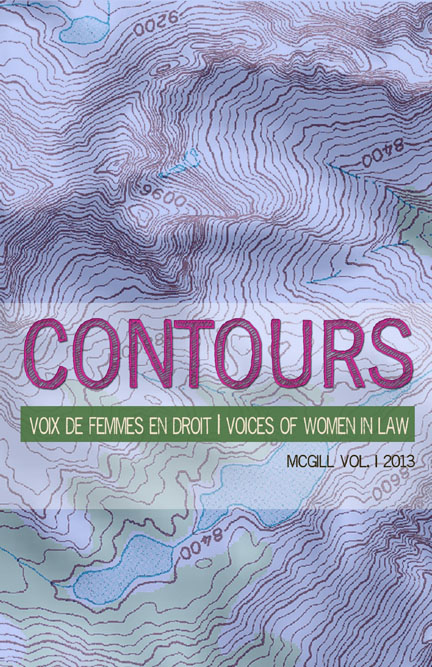McGill University Faculty of Law has a new resource for women. This month, first-year law students Charlotte-Anne Malischewski and Erin Moores launched Contours, a magazine for women in law.
 “We witnessed many women in the faculty express concerns about reconciling their careers with family life, succeeding as women in a variety of public and private legal fields, and overcoming discrimination in the workforce,” says Malischewski.
“We witnessed many women in the faculty express concerns about reconciling their careers with family life, succeeding as women in a variety of public and private legal fields, and overcoming discrimination in the workforce,” says Malischewski.
So she proposed a publication to address her fellow female classmates’ interests and concerns, and has received a great deal of positive feedback since. The law school’s dean’s discretionary fund also provided some funding for the magazine.
Malischewski says it’s important for the women at the law school to have an outlet to express themselves.
“[W]omen are too often told what to think and how to act by men around them,” she says. “Male voices still dominate classroom discussions, men still outnumber women in positions of power in legal firms, and the law itself continues in many ways to represent and protect patriarchy.
“I think it’s important for women to have a safe space in which to express themselves that allows for conversations often limited to private interactions to be brought into the public discussion. We share a lot of similar concerns, but we are also each aware of different aspects of the intersection of women and the law and unaware of others.”
For the April 5 inaugural edition of Contours, to be published annually, Malischewski says they received a wide range of submissions from female students and faculty members.
“We welcomed all responses — argumentative or emotional, academic or experiential, in writing or art — because we believe that all of these expressions are valuable to our understanding of each other and of women’s experiences in relationship with the law in all its forms,” she tells Legal Feeds.
Included in the first edition are profiles of female professors and lawyers, a feature on how the justice system in Canada is failing migrant workers, and a how-to article on creating student-initiated seminars around gender issues and the law.
The articles “remind us that no matter what, women must keep raising our hands in class and keep making our voices and stories heard,” says Malischewski.
 “We witnessed many women in the faculty express concerns about reconciling their careers with family life, succeeding as women in a variety of public and private legal fields, and overcoming discrimination in the workforce,” says Malischewski.
“We witnessed many women in the faculty express concerns about reconciling their careers with family life, succeeding as women in a variety of public and private legal fields, and overcoming discrimination in the workforce,” says Malischewski.So she proposed a publication to address her fellow female classmates’ interests and concerns, and has received a great deal of positive feedback since. The law school’s dean’s discretionary fund also provided some funding for the magazine.
Malischewski says it’s important for the women at the law school to have an outlet to express themselves.
“[W]omen are too often told what to think and how to act by men around them,” she says. “Male voices still dominate classroom discussions, men still outnumber women in positions of power in legal firms, and the law itself continues in many ways to represent and protect patriarchy.
“I think it’s important for women to have a safe space in which to express themselves that allows for conversations often limited to private interactions to be brought into the public discussion. We share a lot of similar concerns, but we are also each aware of different aspects of the intersection of women and the law and unaware of others.”
For the April 5 inaugural edition of Contours, to be published annually, Malischewski says they received a wide range of submissions from female students and faculty members.
“We welcomed all responses — argumentative or emotional, academic or experiential, in writing or art — because we believe that all of these expressions are valuable to our understanding of each other and of women’s experiences in relationship with the law in all its forms,” she tells Legal Feeds.
Included in the first edition are profiles of female professors and lawyers, a feature on how the justice system in Canada is failing migrant workers, and a how-to article on creating student-initiated seminars around gender issues and the law.
The articles “remind us that no matter what, women must keep raising our hands in class and keep making our voices and stories heard,” says Malischewski.







